Attorneys Fredrick E. Charles and Dennis G. Charles have maintained a practice of law in the Lehigh Valley for nearly four decades, and have successfully represented clients in the federal and state courts in counties across the Commonwealth of Pennsylvania.
Our Mission
“At Charles Law Offices we strive each day to honor and apply the invaluable lessons of life taught to us by our parents and family members concerning integrity, honesty, hard work, meticulous preparation, and service to others, and to uphold and surpass the stringent ethical and professional requirements of the Rules of Professional Conduct, in an effort to provide the highest quality of legal representation for our clients, to advance the administration of justice, and to epitomize the legal profession’s goals of public service.”
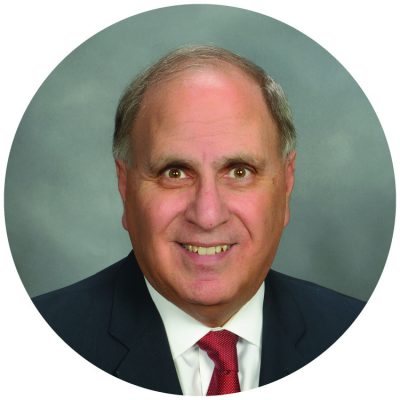
Attorney Fredrick E. Charles
During his career as a trial lawyer, Attorney Charles has obtained successful jury verdicts in the prosecution and defense of professional liability claims involving medical and legal malpractice. He also has obtained successful verdicts and dispositions in criminal cases with charges ranging from first degree murder to aggravated assault to theft-related charges, and in civil trials involving child custody issues. In addition to his work in the criminal law and domestic fields, for the past 25 years Attorney Charles has focused his practice of law on employment discrimination, civil rights violations, claims of excessive force and police brutality, and personal injury, wrongful death and survival cases brought in the federal and state courts. He is rated by his peers and clients as preeminent in legal ability and ethical standards, and is endorsed by the Better Business Bureau with an A+ rating.
Attorney Fredrick E. Charles is a 1972 graduate of the University of Pittsburgh, where he attained Dean’s List Honors. He attended law school at the University of Louisville, where he also attained Dean’s List Honors and began his law practice in Allentown, Pennsylvania in October, 1977.
In July, 1979, he was appointed to the position of Assistant Public Defender for Lehigh County, a position he served until July, 1981 when, at the age of 30 he was named Chief Public Defender of Lehigh County, one of the youngest lawyers ever to receive such an appointment.
More About Fredrick
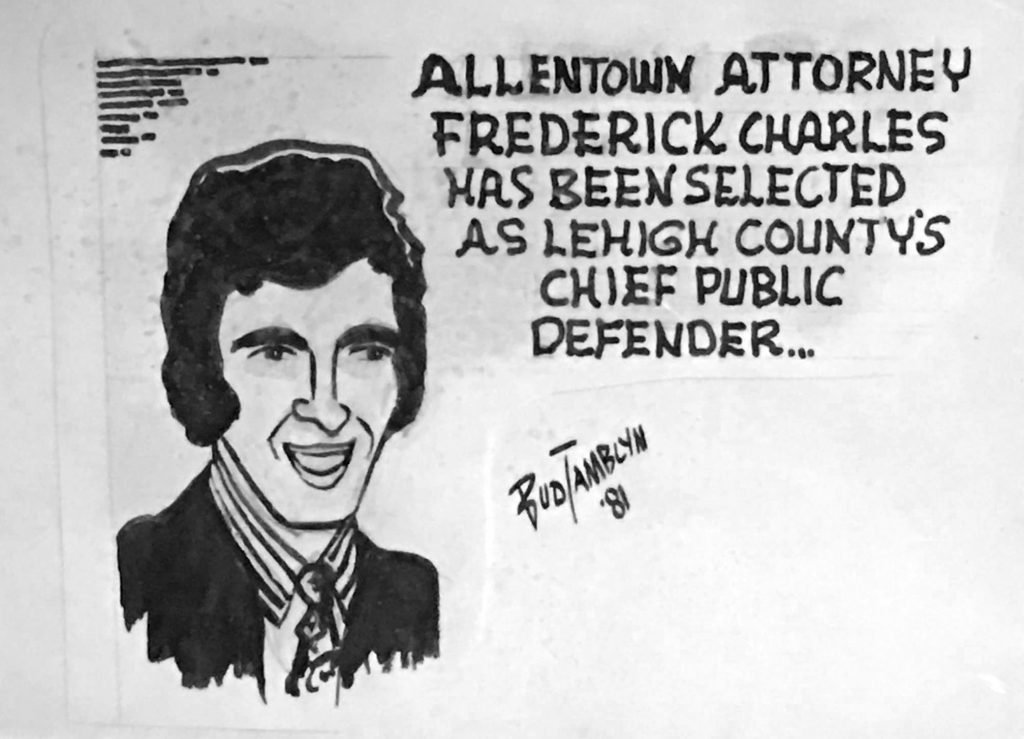
While serving as Chief Public Defender Attorney Charles also served as the Eastern Regional Director of the Pennsylvania State Defenders Association. During his tenure as Chief Public Defender, Attorney Charles presided over the defense of more than 20,000 criminal cases brought into Adult and Juvenile Court. He also oversaw the defense of involuntary commitment cases brought under Pennsylvania’s Mental Health Procedures Act.
In September 1990, Attorney Charles married his college sweetheart, Denise Albert, of Greensburg, Pennsylvania. The couple and their son, Ian Nathaniel made the Lehigh Valley their home. Denise’s family also has roots in law, medicine and insurance. Denise’s brother, the Honorable James Albert, Jr. is the longest tenured magistrate district justice in Westmoreland County, Pennsylvania, having served in that position since 1991. Their sister-in-law, Rana Ziadeh, M.D. is a prominent pediatrician in Westmoreland County. Denise’s brother, Jeffrey Albert, maintains an insurance practice which caters to the needs of the elderly.
In November, 1991, Attorney Charles was named Solicitor of Lehigh County, a position he held until January, 1994. Attorney Charles is the only attorney in the history of Lehigh County to have held the positions of County Solicitor and Chief Public Defender. From 1979 until the present, Attorney Charles has been in private practice with his brother, Dennis. He has successfully prosecuted cases which have had a profound impact on the laws and standards at the state and federal level. He has successfully argued cases before the United States Third Circuit Court of Appeals and before the United States District Courts. Two of his cases successfully argued before the Third Circuit Court of Appeals have changed or had a profound impact on the laws of the Third Circuit and other Circuits of the United States Federal Court. He has appeared before the Pennsylvania Supreme Court and received statewide recognition for a challenge he presented to Pennsylvania re-districting procedures. He also has successfully presented cases before the Pennsylvania Superior Court and Courts of Common Pleas throughout the Commonwealth.
Due to his background, Attorney Charles has devoted a portion of his practice to sports and entertainment law, and contract negotiation. While at the University of Pittsburgh, Greensburg Campus Attorney Charles was a standout performer on the school’s first basketball team. After becoming an attorney, he was appointed Chief Deputy Commissioner for the Pennsylvania State Athletic Commission, overseeing Amateur and Professional Boxing and Professional Wrestling in eastern Pennsylvania. Attorney Charles has served as Special Counsel to an NFL Football franchise, to professional athletes and professional radio and television broadcasters. He has further served as legal counsel to a national professional wrestling corporation which featured stars such as Bruno Sammartino, Walter “Killer” Kowalski, Domenic DeNucci, Larry Zbyszko and “Luscious” Johnny Valiant.
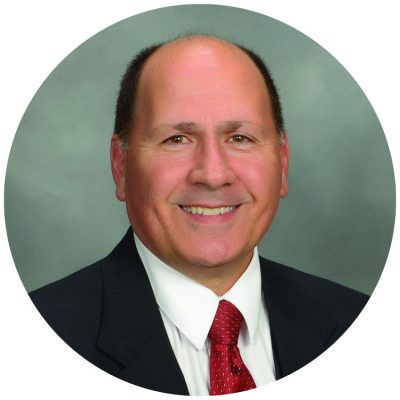
Attorney Dennis G. Charles
In a professional career spanning more than 40 years and devoted to zealously protecting the rights of his clients, Attorney Dennis G. Charles has received national, statewide, and local recognition. He has appeared on the A & E Network television show “American Justice” with Bill Curtis, Court TV, the Lifetime Movie Network series “Killer Kids,” and AM Philadelphia. The Philadelphia Inquirer Newspaper featured Attorney Charles in a front-page article entitled “Insanity on Defense.” He is rated by his peers as “AV Preeminent,” signifying the highest level of professional excellence for his legal knowledge, communication skills, and ethical standards. He is endorsed by the Better Business Bureau with an A+ rating and, with an extraordinary number of criminal and civil trial victories, is one of the foremost trial attorneys in Pennsylvania.
Attorney Dennis G. Charles is a 1976 graduate of Muhlenberg College in Allentown, Pennsylvania, where he was consistently recognized for his academic achievements and was a star golfer competing in the Middle Atlantic Coast Conference. After attaining Dean’s List Honors throughout his college career and graduating cum laude, Attorney Charles attended Temple University School of Law. In October, 1979, Attorney Charles graduated from Temple Law School, having attained Dean’s List Honors, and joined his brother, Fredrick, in the practice of law in Allentown, Pennsylvania.
In 1981, Attorney Charles was appointed to the position of Assistant Solicitor for Lehigh County by former County Solicitor John E. Roberts. The same year, he received an appointment to the position of Deputy Commissioner of the Pennsylvania State Athletic Commission, overseeing Amateur and Professional Boxing and Professional Wrestling in eastern Pennsylvania.
More About Dennis
In addition to representing Lehigh County’s interests as an Assistant Solicitor, Attorney Charles maintained a private law practice which focused upon criminal, personal injury, medical malpractice, and family law litigation. During this period, Attorney Charles also assisted the Lehigh County Public Defender’s Office in providing legal representation to indigents in criminal homicide cases and other serious felonies.
In 1986, Attorney Charles transferred from the Lehigh County Solicitor’s Office to the Lehigh County Public Defender’s Office. While maintaining a full private practice, Attorney Charles has provided legal representation to poor and indigent citizens who have been charged with serious crimes. For more than 25 years, he has served as Lehigh County’s primary legal defense counsel representing individuals subjected to involuntary mental health commitment proceedings under Pennsylvania’s Mental Health Procedures Act. Since 1989, he has defended more than 15,000 mental health involuntary commitment cases brought under Pennsylvania’s Mental Health Procedures Act.
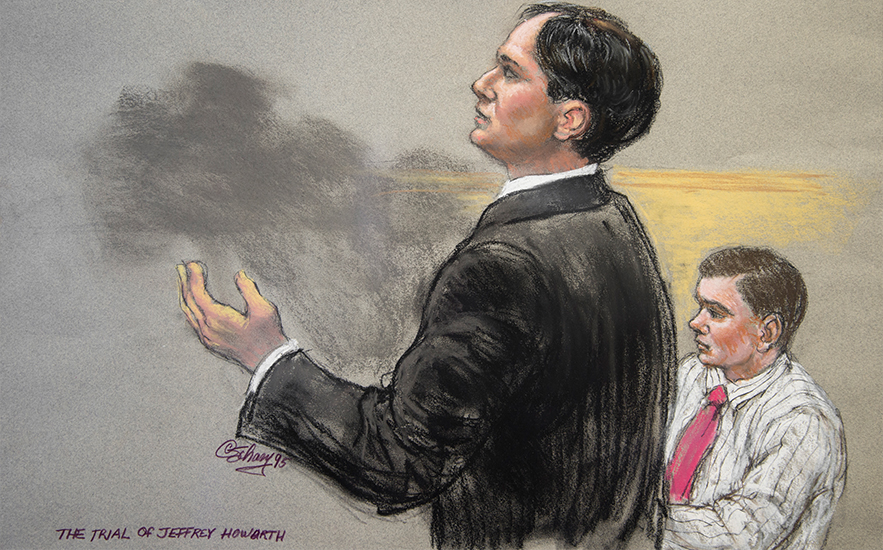
In 1995, Attorney Charles was selected to represent Jeffrey Howorth, a teenager who was charged with two counts of first degree murder following the shooting deaths of both of his parents. During the course of his legal representation of this young man, Attorney Charles realized that the teenager suffered from a mental illness to a degree that he should not be held legally responsible for his actions. Drawing upon his extensive and unparalleled experience in the Mental Health field, Attorney Charles defended this young man on the grounds of legal insanity. Through the testimony of expert and fact witnesses, Attorney Charles meticulously proved the elements of his legal insanity defense before the jury, and the jury returned a verdict of Not Guilty by Reason of Insanity (NGRI). The Howorth trial received national media coverage. The Not Guilty by Reason of Insanity (NGRI) verdict still is unique in the annals of Lehigh County jurisprudence. Attorney Charles is the only attorney in Lehigh County’s history who has attained multiple Not Guilty by Reason of Insanity (NGRI) jury acquittals based upon the defense of legal insanity.
During his career, Attorney Charles has attained numerous successful jury and non-jury verdicts in a wide variety of adult and juvenile criminal cases involving, without limitation, criminal homicide (first, second and third degree murder, voluntary manslaughter and involuntary manslaughter); crimes by the mentally ill; offenses against property (robbery, burglary, arson, forgery, theft and related offenses); assault and violent crime; rape and sexual offenses; firearms and deadly weapons offenses; felony drug offenses; white collar crime; driving under the influence of alcohol or controlled substances; and juvenile delinquency matters.
Attorney Charles further provides skilled and professional representation in federal and state civil litigation involving personal injury matters (including wrongful death and survival claims; medical malpractice; birth trauma; automobile, truck and motorcycle accidents; products liability; premises liability; mass transit accidents; and nursing home abuse) and family law matters (including divorce; child custody; equitable division of marital assets; support and alimony; protection from abuse; and premarital agreements). In addition to his many criminal and civil trial victories in the Courts of Common Pleas and Federal Courts throughout the Commonwealth of Pennsylvania, Attorney Charles on multiple occasions has successfully served as appellate counsel in cases presented to the Pennsylvania Supreme Court and the Pennsylvania Superior Court, including achieving as court-appointed counsel a reversal by the Pennsylvania Supreme Court of a Court of Common Pleas rape conviction, resulting in the defendant’s acquittal and discharge from imprisonment.
Attorney Charles’ personal interests have impacted his legal practice. In addition to being a scratch golfer and an expert skier, Attorney Charles is a FAA licensed and instrument-trained pilot and aircraft owner, and a member of the Aircraft Owners and Pilots Association (AOPA) and the Mooney Aircraft Pilots Association (MAPA). Attorney Charles also is a skilled equestrian, being the proud owner of a champion AQHA registered quarter horse and, along with his brother, Fredrick, a devoted dog and animal lover. Both he and his brother are animal rights activists and offer services in the area of animal law litigation. As a result of his personal interests, Attorney Charles’ law practice includes the fields of aviation law, sports law, and animal law.
Charles “Chink” Charles
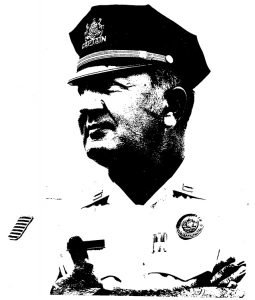
The Charles Brothers’ devotion to the law and protecting the rights of those in need of legal representation is derived from the actions and lessons of life taught by their parents. Their father, Charles “Chink” Charles, was a true legend in the Lehigh Valley. Chink Charles served as a United States Army Combat Engineer in World War II.
MORE ABOUT CHARLES
Upon his returning home after the war he was an undefeated amateur boxer and was recruited to play semi-professional football with the Wilkes-Barre Barons. He signed a football contract with the Wilkes-Barre Barons paying him One Hundred ($100.00) Dollars per game in the 1940’s.
He also worked as an ironworker and helped to construct the Allentown School District Stadium and several other building projects within the Lehigh Valley, the Commonwealth of Pennsylvania, and neighboring states. He maintained his membership in the Ironworkers Union throughout his lifetime.
In 1948, he married Laura Slyman, one of nine children, born and raised in Greensburg, Pennsylvania. Shortly after the couple’s birth of their first son, Fredrick, Chink Charles began a thirty-five year career in law enforcement as a police officer with the Allentown Police Department. During his career in public service, Chink Charles rose from the rank of a patrolman, to Detective, to Line Captain, to Line Deputy Chief of Police, and to Chief of Police for the City of Allentown.
In 1960, he was selected to serve as the personal bodyguard for former United States presidents John F. Kennedy, Richard M. Nixon and Lyndon B. Johnson during their campaign visits to Allentown, Pennsylvania. In 1968, Chink Charles graduated at the top of his class from the prestigious Southern Police Institute command school of the University of Louisville. In 1983, he was awarded the Purple Heart from the City of Allentown for his efforts in resolving a hostage crisis on the City’s east side, during which he was shot and wounded, yet maintained his command through the resolution of the crisis. Chink Charles retired from the police force in 1986, at which time he received numerous awards and citations and was recognized as the Man of the Year by the Allentown Police Reserve Officers. In addition to his accomplishments in law enforcement, Chink Charles is one of the original founders of the Allentown Municipal Employees Federal Credit Union (AMEFCU) in 1955, which services police, fire, emergency responders, public works employees, other municipal employees and their families, and was honored by the AMEFCU on its 50th anniversary in 2005. He also was active in the Miller Blood Bank and its efforts to serve the Lehigh Valley community.
Other Familial Inspiration
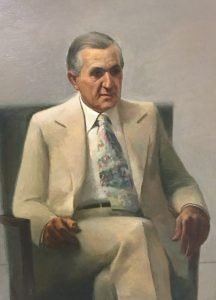
In addition to their father’s stellar career in law enforcement, the Charles Brothers were influenced by other family members who practiced law and served as public servants. Their father’s cousin, the Honorable George J. Joseph, served four terms as the Lehigh County District Attorney from 1960 to 1976.
MORE ABOUT CHARLES
Their uncle, Attorney Fredrick I. Charles served as an assistant Lehigh County District Attorney prosecuting major felony cases in Lehigh County, and maintained a private practice of law for nearly three decades. Both individuals had a profound impact on the Charles Brothers decision to pursue careers in law.
Upon his returning home after the war he was an undefeated amateur boxer and was recruited to play semi-professional football with the Wilkes-Barre Barons. He signed a football contract with the Wilkes-Barre Barons paying him One Hundred ($100.00) Dollars per game in the 1940’s.
He also worked as an ironworker and helped to construct the Allentown School District Stadium and several other building projects within the Lehigh Valley, the Commonwealth of Pennsylvania, and neighboring states. He maintained his membership in the Ironworkers Union throughout his lifetime.
The Charles Brothers’ devotion to their clients and the practice of law is also the product of the lessons of life taught to them by their mother, Laura Slyman Charles. Their mother, one of nine children who survived the Great Depression, was a 20-year inspector and lay-out operator for Bell Labs and Western Electric Company, which produced much of the circuitry used in America’s space program. She taught her sons to recognize, have compassion for, and help the poor, indigent and less fortunate, and those whose legal rights need protection.
The Charles Brother’s uncle, Albert G. Moses, a respected and award-winning educator and high school principal, taught them the importance of discipline, dedication, and sacrifice in pursuing their education. Their uncle, Dennis J. Slyman, Esquire, a consummate Westmoreland County trial attorney, also guided the Charles Brothers, and was an inspiration to both brothers as to the value of working hard, perfecting their craft, and zealously representing their clients in a professional and respectful manner. Their uncle, Eugene Slyman, is a former administrator in the Federal Aviation Administration (FAA) under past Directors Najeeb E. Halaby and Elizabeth Dole, and was an inspiration to Attorney Dennis G. Charles to become a pilot, an aircraft owner, and a legal advocate for other pilots and citizens in need of aviation law advice and representation.
The Charles Brothers’ deep and abiding respect, admiration, and appreciation for America’s military veterans has its genesis not only in their father’s service to our country as a combat engineer fighting in Italy and Germany in World War II, but also in the military service of their uncles. Their father’s brother, George Charles, was an Army Captain in World War II, and his brother, Fredrick I. Charles, served in the United States Airforce. Their mother’s brother, Samuel Slyman, was a decorated Army Lieutenant Colonel who fought in World War II and Korea. Her brother, Eugene served in the United States Navy, and her brother-in-law William Morse was a 20 year veteran of the United States Marines, fighting in World War II and Korea.
A Lawyer is Mandated to be Diligent, Prompt and Competent in All Professional Functions.
The Rules of Professional Conduct dictate a lawyer’s responsibilities. A lawyer performs multiple functions in representing his clients. He is an officer of the court responsible for the quality of justice as a public citizen, an advisor to his client, providing an informed understanding of his client’s legal obligations and rights and their practical consequences, an advocate charged with the responsibility of zealously asserting his client’s position in accordance with the adversary system’s rules, a negotiator who attempts to obtain advantageous results for his client while abiding by the requirements of fair and honest treatment of others, and an evaluator who examines his client’s legal affairs and reports about them to his principal and others.
In his representation of the client, a lawyer is required to maintain communication with the client. Unless the Rules of Professional Conduct or the law require otherwise, a lawyer must keep his client’s communications confidential. In his professional service to his client, as well as his personal and business affairs, a lawyer is required to abide by the requirements of the law. A lawyer must not utilize legal procedures to intimidate or harass others but, rather, for legitimate purposes only. He must display respect for judges, public officials, other lawyers and the legal system and all who serve it. It is a lawyer’s responsibility to uphold the legal process and, when required, to challenge the propriety of official action.
A lawyer should endeavor to achieve the highest degree of skill, to advance the legal profession and the law, and to epitomize the legal profession’s goals of public service. In his role as a public citizen, a lawyer should strive to improve the law, the administration of justice, the legal profession’s quality of service rendered to clients and their access to the legal system. A lawyer should cultivate, as a member of a learned profession, knowledge of the law over and above its use for clients, and utilize that wisdom to reform the law and fortify legal education.
A lawyer should foster the public’s trust in, and understanding of, the justice system and the rule of law, since public support and participation in legal institutions in a constitutional democracy is required in order to maintain their authority. A lawyer should be ever cognizant of weaknesses and shortcomings in the administration of justice, and of the reality that the indigent, and sometimes people who are not indigent, are unable to financially afford satisfactory legal representation.
Therefore, a lawyer should dedicate his resources and professional time and avail himself of public influence to assure equal access to our system of justice for all individuals who cannot afford or obtain satisfactory legal representation because of social or economic barriers.




